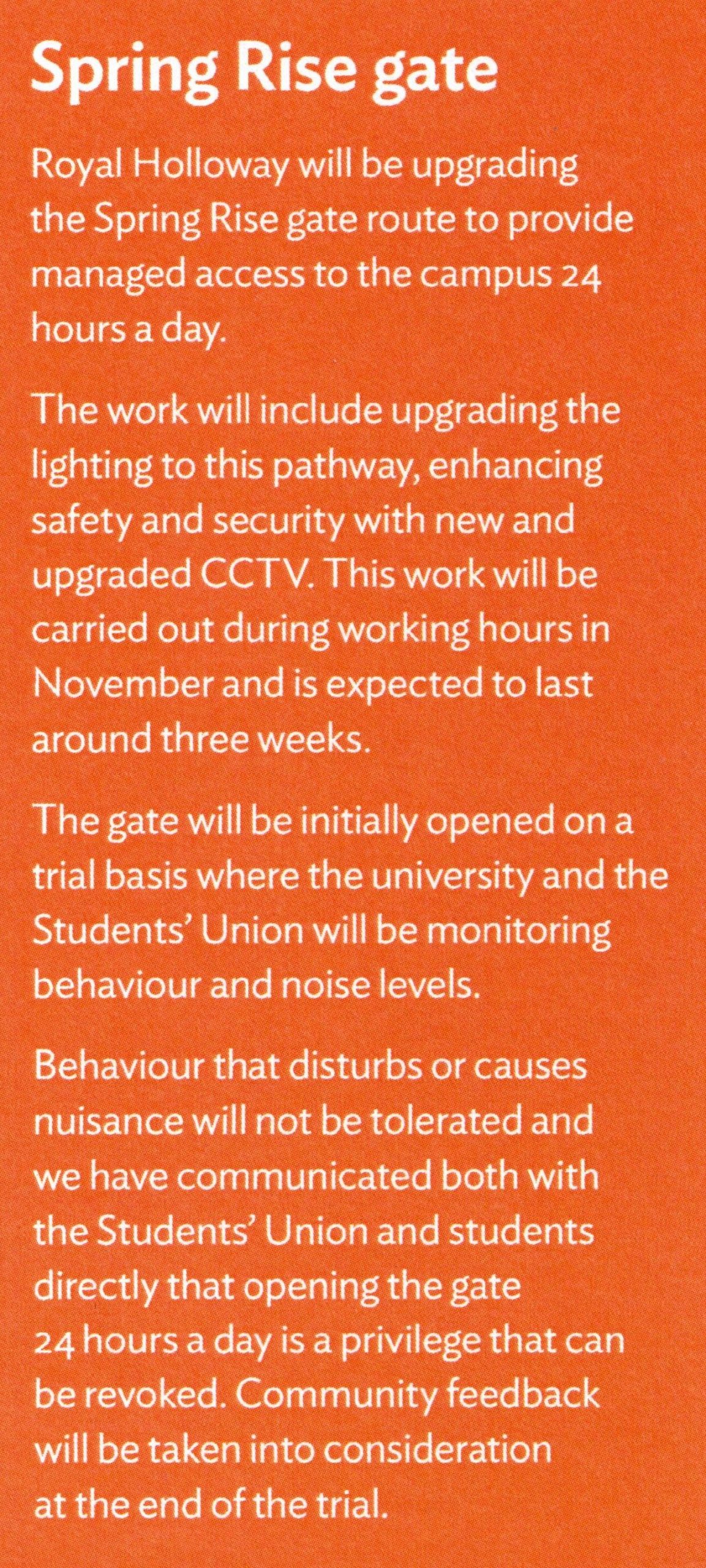Regular visitors to this site will have noticed that we have started inviting residents to submit their stories about issues relating to Royal Holloway and, as a result, we have now been contacted by a number of readers about their experiences.
The story that we are going to feature here concerns something that happened several years ago but is of interest because of the number of residents that were affected: the Spring Rise Gate.
The Spring Rise Gate will be very familiar to residents living in the south west corner of Egham as it has been the subject of controversy and Royal Holloway student noise nuisance for many years. A number of residential streets lead to this gate which forms an entrance to Royal Holloway’s campus close to the student accommodation blocks. However, the stream of rowdy students that used this gate late at night and in the early hours of the morning caused intolerable misery for the residents that lived in those streets and resulted in numerous complaints to the university.

In response to these complaints, the university published an article in its own newsletter, Community Matters, claiming that changes would be made to the gate to improve security and access and that the gate would be opened on a ‘trial basis’ during which both the university and Students’ Union would be monitoring behaviour and noise levels. The article also claimed that ‘Behaviour that disturbs or causes nuisance will not be tolerated’ and that community feedback would be taken into consideration ‘at the end of the trial.’
Having been affected by the problems caused by the opening of the gate, one resident wrote to the University’s Estates Director, Mr Mike Berry, asking for details of the trial and, specifically, information on the parameters that would be measured, how noise levels would be monitored, the dates on which the trial would begin and end and how the trial would be assessed. Royal Mail subsequently confirmed that the letter had been delivered but our resident didn’t receive a reply.
Two months later, our resident wrote to Mike Berry again enclosing a copy of the original letter and asking that the information requested be provided within the next seven days. Again, Royal Mail confirmed that the letter was delivered but, again, no reply was received.
It’s perhaps worth pointing out here that, as a public authority, Royal Holloway is subject to the Freedom of Information Act (FOI Act) and it is, therefore, under a statutory obligation to respond within 20 working days and it would be quite surprising if, as a member of Royal Holloways’ Executive Management Team, Mr Berry was not aware of this.

Mike Berry, Director of Estates for Royal Holloway, refused to reply to resident’s request for information.
After waiting a further four weeks, our resident wrote to the then Principal, Professor Paul Layzell explaining the situation and requesting a ‘full internal review’ of the college’s response to the request for information which is the correct procedure to follow under the FOI Act rules. The letter was copied to Philip Hammond MP who responded just a few days later to say that he has written to Professor Layzell about the matter: only now did things begin to move.
Guidelines issued by the Information Commissioner’s Office state that internal reviews should take no longer than 20 working days but it was 28 days later – and four months after the first letter to Mike Berry – that our resident received the college’s first reply.
The letter, sent by Dr David Ashton, the college’s then Chief Operating Officer, conceded that the college had been in breach of statutory requirements of the FOI Act which, Dr Ashton explained, ‘was due to an internal oversight’.
Astonishingly though, Dr Ashton’s letter, part of which is reproduced below, then went on to explain that use of the word ‘trial’ in the article was not intended to mean that there would be a formal monitoring testing process or period!

Compare Dr Ashton’s comments though, with the wording of the article which specifically states that the university (and Students’ Union) will be ‘monitoring behaviour and noise levels’. The article also refers to ‘the end of the trial.’
One is left wondering just how sincere and honest Royal Holloway is in it communications with local residents and whether statements and articles such as this one in Community Matters are little more than platitudes intended to make residents believe that their concerns are being responded to!
If you have a story relating to the handling of RHUL student related issues, good or bad, we would like to hear from you. Please send an email to: ‘enquiries@weneedtotalkaboutroyalholloway.com’ with a brief outline and someone will get back to you.